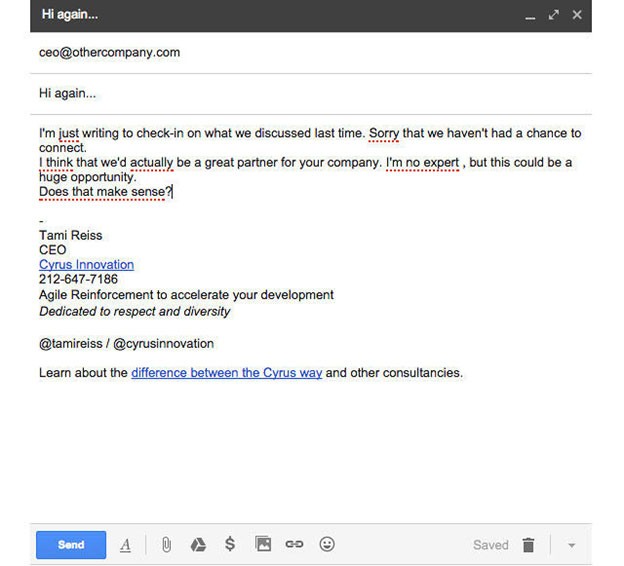“Stop saying sorry!”
That is what one panelist firmly yet tactfully suggested in response to an audience participant during Q&A at an event that I sat front and center in attendance at last week. It was an excellent event I might add.
When I heard the participant say the “S” word I squirmed in my seat a bit and cringed inside like I would if someone scraped his or her nails on a chalkboard.
I knew right away this would be the topic of my next blog post. But something told me that at least one of the strong, highly successful female leaders on the panel would have a word or two to say in real time to the participant who used the “S” word. I was right.
I was glad that the panelist “went there.” Truth be told, I sometimes have to consciously avoid the “S” word myself. Although there is the occasional slip up for me using the word is not habitual. On those occasions I do say sorry, I am typically aware of context and deliberate.
Sorry is So Overused
In a business or professional setting, more often than not the word sorry is overused and used out of context – moreover, it is frequently women who repeatedly overuse or misuse it.
Although our intention is to be endearing and polite, the real impact is to diminish the perception of our authority and power (Note to reader: Don’t be mistaken; men also abuse its use at times).
Projecting a strong professional brand, presence and image requires using self-assured words and language when you speak – and, in countless situations sorry can be the weakest of all your word choices.
Often the use of the word sorry in a professional setting is more of a knee jerk reaction when speaking and often a situation that you haven’t even provoked, as was the case with the woman at the WBJ event. Here are a few word choice options you can use instead of sorry:
- I regret
- Please excuse
- It is unfortunate
- I made a mistake or bad decision
- I apologize
Keep in mind that saying sorry can undermine your image and reputation both spoken and written. To address the issue Cyrus Innovation, a software development agency developed a plug-in called Just Not Sorry that was inspired by the overuse of minimizing words used by women. It is a free Gmail plug-in that provides an alert when you use weak language (e.g. sorry, just and I think) in your email.

Image Source: Fast Company
When Should You Say Sorry?
When you’ve been completely egregious with your words and/or behavior, saying sorry emphasizes your remorse and sends a strong and unwavering message that the receiver(s) can hear loud and clear – and believe. It demonstrates humility. It says that your ego isn’t too big to accept and own your mistakes. Ultimately, you are more likely to keep your reputation in tack.
A word of caution. It is not enough to simply say the word sorry or give an apology – how you say it and context counts just as much and probably more. If you are not authentic and the tone of voice used to deliver the sorry sounds disingenuous, people will see right through you, which may further damage your reputation. The following three examples are cases in point:


